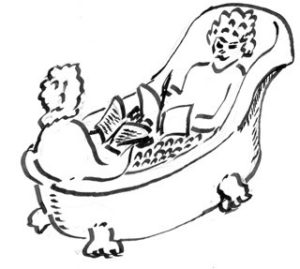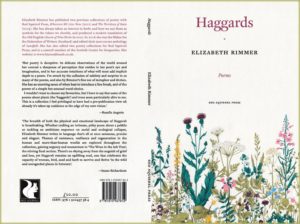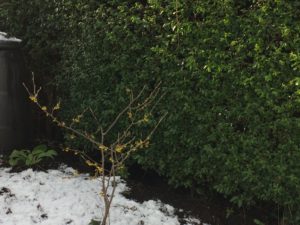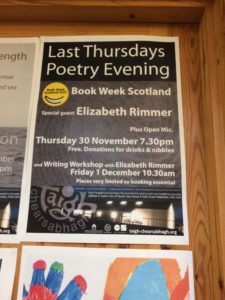
This was taken on a very frosty walk at Cambus yesterday, where the river Devon flows into the Forth. The light was wonderful, and we’ll be going back there again, as soon as we thaw out!
This pretty much sums up my year – wonderful if you look at it one way, awful in another light. It’s easy to see why it was so bad. Both Trump and Brexit have turned out even worse than we could have told them they would be, and some of the recurring health problems that plague our family came back with their big boots on. Then there were upheavals in many of the poetry circles I frequent, and many of my friends and family have dealt with severe illnesses and bereavement. It’s mostly my job to look after people, but this year hit hard, reaching a real low when I found myself in a street in Glasgow suddenly, and mercifully temporarily, unable to work out who I was or where I lived.
This lasted for a very short time – no longer than it takes to orientate yourself from a dream you wake up from wondering whether it was real or not – but it was enough to make me take stock of what on earth I think I am doing with my life. And from there on it was all good. Everyone who had health problems has received very good care, and I go into next year with very much less responsibility and concern. I cut back my involvement in projects that weren’t working for me, and and called a few spades by their proper names instead of pretending that things were fine and I would go on pretending I was okay with things.
And I looked at the wonderful things that have happened – a fortieth wedding anniversary trip to London, blogging at StAnza, finishing Haggards, the Expressing the Earth conference, which is still bearing fruit in many exciting ways, the Charm of Nine Herbs translation which was so much fun to do, the wonderful reading and workshop at Taigh Chearsabhagh I wrote about last time, editing Landfall for The Federation of Writers, and Matt MacDonald’s Petrichor which will be out next year.
And the books – Rachael Boast’s Void Studies, Sophie McKeand’s Rebel Sun, Jim Carruth’s Black Cart, Rachel McCrum’s First Blast to Awaken Women Degenerate, JL Williams After Economy and Judith Taylor’s Not in Nightingale Country in poetry, and Claire Wellesley-Smith’s Slow Stitch, which inspired a new type of creativity. Those have been absolutely brilliant.
So it’s been impossible to find a balanced response to this year – average it was not. And the outlook is similarly unstable. And yet I find myself believing very firmly in human resilience and common sense. The world is full of people who resist hysteria and self-destruction, who refuse to be party to the nonsense we see around us, who respond to a crisis with gentleness, compassion and creativity. I’ll finish with the last bit of The Wren in the Ash Tree which sums it up:
A wren is singing
in the damp hush after the rain.
Between desire and action is insight,
a quiet emptiness where something like
the startling wake of poetry in my head
can happen, making new.
Among the wrecked buildings
Abandoned in the heart of Govan
there are patches of tilled earth
lavender and mint, two carrot plants,
a stand of potatoes. On the door
of an abandoned church, a poster –
classes for drummers, taekwondo,
English as a second language,
poetry for those who have the time
on a wet Friday morning, in all
the languages of earth.
In the silence, a wren is singing.
This is probably the last post of this year, so Ill take the chance to wish everyone a happy Christmas and New Year.

 As part of Callander Summerfest, there will be an evening of nature themed poetry
As part of Callander Summerfest, there will be an evening of nature themed poetry The Bath Hotel,
The Bath Hotel, 








